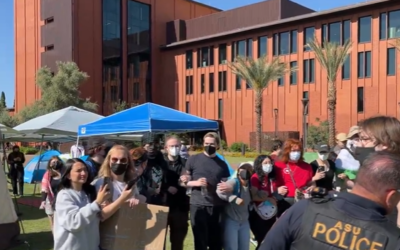By Daniel Stefanski |
Arizona’s Republican Schools Chief is taking the state’s Democrat Governor and Attorney General to court.
Last week, Superintendent of Public Instruction Tom Horne announced that he had “filed a lawsuit against Governor Katie Hobbs and Attorney General Kris Mayes for a judicial declaration that all schools must obey a voter passed and protected initiative that English language learners must be taught in English immersion rather than dual language.”
In a statement that accompanied the press release, Horne said, “Governor Hobbs is named as a defendant because of a court of appeals decision stating that the governor is a proper defendant in these kinds of cases because of the constitutional requirement that she see it to it that the laws are faithfully executed. Attorney General Mayes is named because the same case states that an action questioning the constitutionality of a law names the Attorney General. A law passed by the legislature in 2019 has been interpreted by some as authorizing dual language instruction. This is incorrect because the voter-protection law is part of the Arizona Constitution and any change to a voter-protected initiative must further the purpose of what voters intended. Dual language instruction is the opposite of the initiative’s purpose.”
The Arizona Department of Education provided context for the initiative in question, adding, “The initiative, which passed by a margin of over 60%, states explicitly: ‘All children in Arizona public schools should be taught English by being taught in English, and all children shall be placed in English language classrooms.’”
Horne also said, “The fundamental purpose of the initiative is that students be taught throughout the school day in English, so they become proficient in English quickly, and can succeed academically, and not that they be taught half a day in another language, which would stunt their ability to master English.”
According to the Department, “the lawsuit also names as a defendant the Creighton school district, which is among the handful of districts defying the law established by the voter approved and protected initiative. The district’s rate of English Language Learners becoming proficient in English last year was 5.1%. This contrasts with some districts referred to in the complaint that have structured English immersion and who’s rates range from 23.87% to 33.03%.”
The lawsuit was filed in the Superior Court for the State of Arizona in the County of Maricopa. Horne asked the Court to declare that “A.R.S. 15-756.01 is unconstitutional if its intent was to authorize dual language without waiver, because it does not further the voter-protected initiative’s purpose that children be taught in English for the entire school day, in order for them to quickly become proficient in English”; and that the State Board’s dual language model, if it is without statutory waivers, is in violation of Arizona law, and the Defendant Attorney General’s opinion that district and charter schools can rely on the State Board’s dual language model without waivers is legal error.”
The court filing from the Arizona Department of Education fulfills a promise made by Horne earlier this summer to take this issue to the judiciary. The scuttle between Horne, Mayes, and Democrat legislators began on June 19, when the Superintendent announced that “public schools that are not teaching English Language Learners in English as required by state law risk losing funds for this legal violation.” Horne said at the time, “Proposition 203, the voter protected initiative passed in 2000, specified that classes for English Language Learners must be taught in English: ‘all children in Arizona public schools shall be taught English by being taught in English and all children shall be placed in English language classrooms.’”
Arizona Attorney General Kris Mayes issued an opinion to answer the question of “which state entity has statutory authority to eliminate a model of structured English immersion approved by the State Board of Education.” Mayes sent her findings to Democrat Representatives Jennifer Pawlik, Laura Terech, Nancy Gutierrez, and Judy Schwiebert.
In her opinion, Mayes wrote, “Arizona law is clear that the Board has the sole authority to eliminate or modify an approved SEI model. The Board also has the sole authority to determine whether a school district or charter school has failed to comply with Arizona law governing English language learners. Only those school districts and charter schools found by the Board to be noncompliant are barred from receiving monies from the English language learner fund.”
The Attorney General declined to answer the Representatives’ question of “whether the Dual Language Immersion SEI Model approved by the Board is consistent with Arizona law.”
The battle over the Structured English Immersion law is the second significant conflict between the Attorney General and Superintendent this year. Horne and Mayes have been locked in escalating public disputes over the state’s universal school choice program.
Daniel Stefanski is a reporter for AZ Free News. You can send him news tips using this link.








